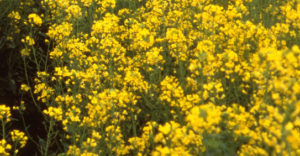
By now you’ve probably heard that a fast-tracked decision by the Oregon Department of Agriculture to open canola production in sensitive seed production zones was temporarily halted thanks to quick legal work by the Center for Food Safety, Oregon-based Friends of Family Farmers, and specialty seed growers. Though a success, the work has really just begun to maintain canola exclusion zones.
The Willamette Valley is one of the best places in the world for growing and supplying specialty seed. Canola easily cross-pollinates with other brassicas, putting the genetic integrity of these crop relatives at risk.
Here’s what’s going on:
The Oregon Department of Agriculture filed a permanent rule at the same time as the temporary rule. The permanent rule making process allows for public comment (unlike the temporary rule) and comments are what we need, as the proposal mirrors the problematic temporary rule. A current canola exclusion zone would be changed to allow canola (including genetically engineered canola) to be grown in the valley unchecked. Read the rule here.
Here’s what you can do:
1. Friends of Family Farmers is circulating a petition that will be delivered to the Oregon Department of Agriculture Director Katy Coba and the Governor during the public hearing on September 28, 2012. Sign the petition here.
2. Attend the public hearing on September 28, 2012, in Salem, Oregon. If you are an affected stakeholder and/or expert, please provide comments at this hearing and encourage other stakeholders (seed producers, farm organizations, seed companies, and others) to do the same. The hearing is at 9 am at the Oregon State Fairgrounds. More details here.
3. Can’t make the hearing? You can provide comments through October 5, 2012, in response to the proposed rule via email or postal mail:
canola-rulemaking@oda.state.or.us
Canola Hearings Officer
Oregon Department of Agriculture
635 Capitol St. NE
Salem, OR 97301-2532
More background:
OSA’s letter to the Oregon Department of Agriculture (August 2012)
OSA’s position in support of canola exclusion zones (February 2007)
Oregon State University research on canola and cross-pollination (January 2006)
Why the rule is flawed (by Friends of Family Farmers)
– The proposed new boundaries allow canola production where 16% of known specialty seed producers operate, and up to 1.7 million acres where specialty seed could potentially be grown.
– The proposed rule does not establish isolation zones to protect brassica seed operations in the area of the Willamette Valley that is opened to canola production.
– The proposed rule requires ALL brassica growers, fresh market broccoli growers, as well as canola growers and specialty seed growers, to mark their plantings on a map. This map is owned and operated by a private organization, over which ODA holds no authority.
– There are no consequences for canola and brassica growers who do not mark their plantings on the map. It is a voluntary system.
– ALL brassica growers, including organic fresh market growers, must “treat” their seed with a fungicide. Such “treatment” is not permitted in organic certification rules. This would make it impossible for growers in this protected area to raise organic brassica crops.
